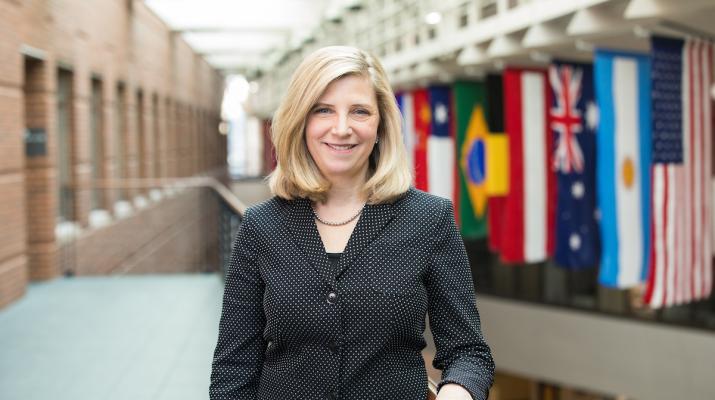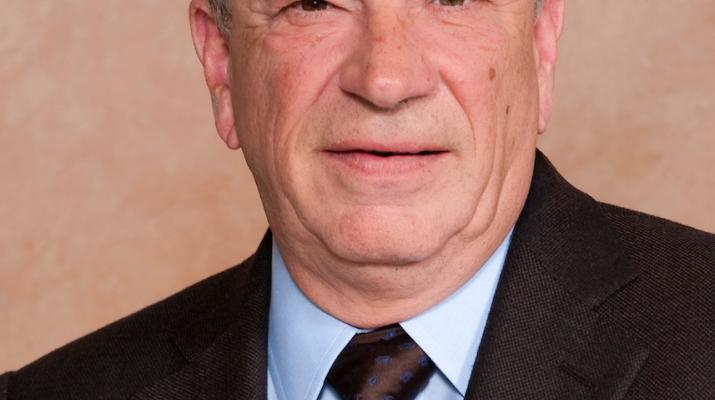
Introducing the Carlson Global Institute
Thursday, September 1, 2011
By Sue Wilson
This fall, as visitors enter the international programs office, they’ll see a new name: Carlson Global Institute. Much more than a new title on offices and communication materials, the change signifies the exciting developments shaping the Carlson School’s global initiatives.
Today, the international office offers much more than programs; its opportunities literally span the globe. The Institute partners with over 30 business schools in more than 25 countries to deliver global education experiences for Carlson graduate and undergraduate students.
The global executive MBA programs reach hundreds of students via classrooms in Minneapolis, China, Austria, and Poland. More than 175 corporations and other organizations are engaged in Carlson’s global initiatives, including General Mills, Cargill, International Dairy Queen, The Toro Company, and 3M. And, the Carlson School is now one of 33 U.S. business schools with a Center for International Business and Education Research (CIBER), a resource that enhances global expertise and economic competitiveness on local, regional, and national levels.
Celebrating 25 Years of Success
The business school’s international programs and partnerships began in 1986 when Professor Emeritus Mahmood Zaidi assumed directorship of the International Program Development Office. While the school’s international initiatives have grown and evolved during the last quarter century, they are guided by the same vision: to build a significant international capability and dynamic network of stakeholders that includes students, faculty, staff, alumni, corporate and organizational leaders, and partners around the world. The international leadership team expanded in 2001 when Michael Houston assumed duties as associate dean and in 2006 when Anne D’Angelo was named assistant dean. These leaders helped build the Carlson School’s excellence in global management education and expanded its dedicated office that oversees international activities.

"Our new name, Carlson Global Institute, highlights the major role that international education plays in the school's strategic footprint."
During the last five years, the Carlson School’s global initiatives have reached a new level of development. A critical milestone was requiring all undergraduate and MBA students to participate in an international experience as part of their academic programs. Another significant achievement was receiving a $1.5 million Title VI grant from the U.S. Department of Education in 2010 to establish CIBER.
Experience is a Good Teacher
“Our new name, Carlson Global Institute, highlights the major role that international education plays in the school’s strategic footprint,” says D’Angelo. “Carlson’s global initiatives are designed to boost students’ competitiveness in the marketplace and prepare them for future management roles. That is why it’s important for them to move beyond classroom discussions and see a country and its culture first-hand.”
D’Angelo says that students often describe their education abroad experiences as life changing. “They tell us they learn more about the United States when they travel abroad, they learn different approaches to business problems, they gain a greater appreciation for other cultures, and they are more marketable,” she says. Adrian Suncar, ’09 BSB, participated in a 2008 Global Immersion program to Maastricht, Netherlands and a 2007 Global Enrichment program in France. He said his education abroad programs helped him develop an unbelievable network throughout the world. “Now, I have friends I connect with from Peru, Australia, France, and even South Africa,” he says.

"Our level of engagement with corporate partners is also unique."
Carlson faculty members who lead short-term business courses and serve as guest lecturers in the Global Executive MBA programs also benefit from new insights and hands-on knowledge. Professor Mark Bergen, the James D. Watkins Chair in Marketing, has taught marketing management in the Warsaw Executive MBA (WEMBA) and the China Executive MBA (CHEMBA) programs for several years. “Teaching in our international programs has brought to life all the exciting things that are happening in business around the globe,” he says. “It enriched my teaching – from uncovering new ways to teach business material to creating new international perspectives and class exercises for our students here in Minnesota. It has led to many wonderful new friendships and many vibrant chances to experience new perspectives, new places, and new cultures.”
The Carlson Advantage
Houston says that the Carlson School’s global education initiatives are one of the school’s distinctive strengths. “Very few business schools have a dedicated office to lead their international experiences and outreach programs. Our level of engagement with corporate partners is also unique. During live-case projects, they provide students with real business issues to investigate while studying abroad. These unique partnerships, which provide benefits for the corporate partners, students, and faculty involved, are one of Carlson’s most distinct offerings,” he says.
When the Carlson School joined a select group of 33 higher-education institutions as host of a Center for International Business Education and Research (CIBER) in 2010, the grant award was a testament to the Carlson School’s commitment to international business education. The center has already hosted seven high-profile outreach events for business people and educators.
Opening the Door to Discovery
Not only does CIBER further the Carlson School’s global initiatives, it also leverages the school’s strengths in research. One current study is examining the impact of international experiences on Carlson School undergraduates. Although the study is still underway, preliminary findings suggest that students with international experiences are more likely to develop global competencies, exhibit greater flexibility in job assignments, and show interest in graduate school. Researchers plan to implement a similar study with MBA students. Another study explored the roles of internal and external stakeholders in global management education and examined the most effective ways for business schools to build relationships with them.
Ready for Tomorrow
What does the future hold for the Carlson Global Institute? “We want to shape the future of global business by helping managers develop the global competencies they need and leading innovative global management education, research, and outreach programs,” says D’Angelo. “Our specific plans include creating an advisory board for the Institute; deepening relationships with companies, educators, and students; and expanding education abroad programs. The Institute will continue to blend the theoretical and the practical as it combines core academic principles with real-life experiences.”
Making a World of Difference
Partnerships with corporations and organizations are a vital part of the Carlson School’s international education efforts. Whether your company would like to host a tour at an international location, provide guest lecturers, or work with students on a practical business issue, your organization will benefit from the experience. These benefits include working first-hand with potential future employees and receiving actionable recommendations from talented business students during live-case programs. Financial support – from businesses and individuals – ensures that students have funding for their international experiences.
Organizations engage with the Carlson Global Institute in the following ways:
• Hosting groups of business students at domestic or international corporate locations
• Sponsoring live-case programs
• Serving as guest lecturers for classes
• Providing financial support for student scholarships, program development, and operations
• Participating in CIBER events
Interested in exploring opportunities? Contact Jennifer Hawkins, program director for Global Corporate and Alumni Relations Engagement, at 612-624-4334 or hawki044@umn.edu for more information.
History of the Carlson Global Institute
1986-90
• International Programs Development Office established
• Professor Mahmood Zaidi named Director
• Faculty exchange programs established in France and Japan
• Semester exchange programs created in France, Japan, and Sweden
• Summer program offered in France
1991-1995
• Formed partnership with Warsaw School of Economics
• Semester exchange program created in Brazil, Austria, Switzerland, Spain, Australia, Belgium, Italy, and England
• “Live case” short-term program established with VU-Vienna and 3M
• Summer program established with Vienna
• International Task Force formulates global strategy for the Carlson School
1996-2000
• Warsaw Executive MBA Program (WEMBA) launched as the U’s first offshore degree program
• Second and third semester exchange programs created in France
• Semester exchange programs created in Costa Rica, the Netherlands, and New Zealand
• Vienna Executive MBA Program (VEMBA) established with Vienna University of Economics and Business
2001-2005
• Michael Houston named Associate Dean of International Programs (now Global Initiatives)
• Costa Rica seminar for MBA students established
• Ethics seminar for MBA students established in England and Belgium
• India seminar for MBA students established
• Semester exchange program created in Norway, Singapore, Denmark, and Hong Kong
• China Executive MBA Program (CHEMBA) launched with Lingnan (University) College in Guangzhou, China
• Virtual Team Project implemented with students in VEMBA and CHEMBA.
• First Carlson School student participated in MBA Enterprise Corps
• Introductory Marketing short term program for undergraduates established in France
2006-2010
• Anne D’Angelo named Assistant Dean of International Programs (now Global Initiatives)
• WEMBA and CEMBA joined Virtual Team Project
• Live case programs with Lingnan (University) College, The Toro Company, and Lenovo in Guangzhou, China
• Live case programs with Cheung Kong Graduate School of Business and Polaroid, International Dairy Queen, and Mosaic in Shanghai and Beijing, China
• Accounting short term program for undergraduates established in Argentina
• Entrepreneurship short term program for undergraduates established in China
• HRIR short term program established for undergraduates in Australia
• Brazil Seminar for MBA students established
• Ethics Scandinavia Seminar for MBA students established in Norway, Sweden, and Denmark
• Semester exchange programs created in Australia, Taiwan, and Thailand
• Joined the CIMBA Consortium of Universities for International Studies offering a semester study abroad in Italy
• First live-case program for undergraduates established with Cargill and Warsaw School of Economics
• Luxury Brands Marketing short-term program for undergraduates established in Italy
• IDSC short-term program for undergraduates established in India
• Faculty vote to require all undergraduate and Part-Time MBA students to have an international experience
• Faculty vote to require all Full-Time MBA students to participate in Global Discovery Program in U.S. and overseas
• Center for International Business Education and Research (CIBER) established through grant from U.S. Department of Education
• Abby Pinto named CIBER Managing Director
2011
• Full-time MBA Global Discovery Program launched as core component of curriculum; initial cohorts participated in international field experience in Chile, China, or Turkey
• Sustainability short-term program for undergraduates established in Brazil
• Live case program for MBA students established with Indian School of Business (ISB) and International Dairy Queen
• Semester exchange program created in Poland, South Korea, and China
• Live case program with Cargill for undergraduates, moved to Turkey in partnership with Ozyegin University in Istanbul
• Live case program with Cheung Kong Graduate School of Business and Hormel in Beijing, China
• International Programs renamed Carlson Global Institute